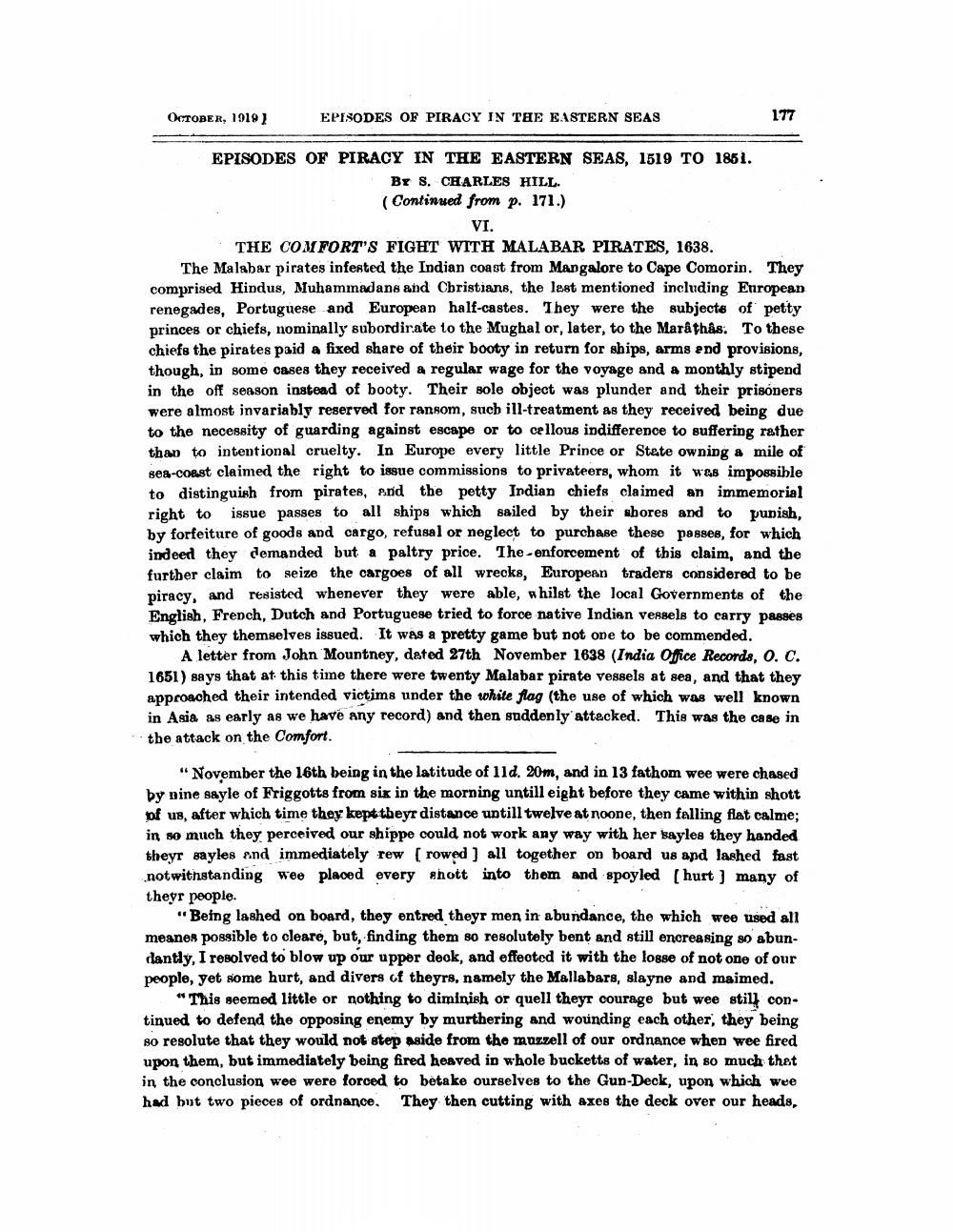________________
OCTOBER, 1919]
EPISODES OF PIRACY IN THE EASTERN SEAS
EPISODES OF PIRACY IN THE EASTERN SEAS, 1519 TO 1851.
Br S. CHARLES HILL.
(Continued from p. 171.)
VI.
177
THE COMFORT'S FIGHT WITH MALABAR PIRATES, 1638.
The Malabar pirates infested the Indian coast from Mangalore to Cape Comorin. They comprised Hindus, Muhammadans and Christians, the last mentioned including European renegades, Portuguese and European half-castes. They were the subjects of petty princes or chiefs, nominally subordinate to the Mughal or, later, to the Marâthâs. To these chiefs the pirates paid a fixed share of their booty in return for ships, arms and provisions, though, in some cases they received a regular wage for the voyage and a monthly stipend in the off season instead of booty. Their sole object was plunder and their prisoners were almost invariably reserved for ransom, such ill-treatment as they received being due to the necessity of guarding against escape or to cellous indifference to suffering rather than to intentional cruelty. In Europe every little Prince or State owning a mile of sea-coast claimed the right to issue commissions to privateers, whom it was impossible to distinguish from pirates, and the petty Indian chiefs claimed an immemorial right to issue passes to all ships which sailed by their shores and to punish, by forfeiture of goods and cargo, refusal or neglect to purchase these passes, for which indeed they demanded but a paltry price. The-enforcement of this claim, and the further claim to seize the cargoes of all wrecks, European traders considered to be piracy, and resisted whenever they were able, whilst the local Governments of the English, French, Dutch and Portuguese tried to force native Indian vessels to carry passes which they themselves issued. It was a pretty game but not one to be commended.
A letter from John Mountney, dated 27th November 1638 (India Office Records, O. C. 1651) says that at this time there were twenty Malabar pirate vessels at sea, and that they approached their intended victims under the white flag (the use of which was well known in Asia as early as we have any record) and then suddenly attacked. This was the case in the attack on the Comfort.
"November the 16th being in the latitude of 11d. 20m, and in 13 fathom wee were chased by nine sayle of Friggotts from six in the morning untill eight before they came within shott of us, after which time they kept theyr distance untill twelve at noone, then falling flat calme; in so much they perceived our shippe could not work any way with her sayles they handed theyr sayles and immediately rew [rowed] all together on board us and lashed fast notwithstanding wee placed every shott into them and spoyled [hurt] many of theyr people.
"Being lashed on board, they entred theyr men in abundance, the which wee used all meanes possible to cleare, but, finding them so resolutely bent and still encreasing so abundantly, I resolved to blow up our upper deck, and effected it with the losse of not one of our people, yet some hurt, and divers of theyrs, namely the Mallabars, slayne and maimed.
"This seemed little or nothing to diminish or quell theyr courage but wee still continued to defend the opposing enemy by murthering and wounding each other, they being so resolute that they would not step aside from the muzzell of our ordnance when wee fired upon them, but immediately being fired heaved in whole bucketts of water, in so much that in the conclusion wee were forced to betake ourselves to the Gun-Deck, upon which wee had but two pieces of ordnance. They then cutting with axes the deck over our heads,




